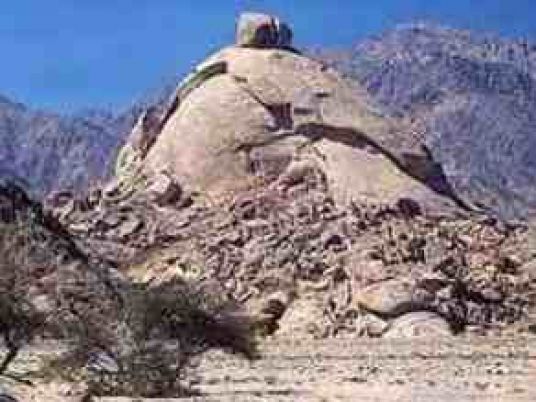
The Environment Ministry offered private sector companies in January the ability to sponsor and protect the Petrified Forest, located near New Cairo, but the natural reserve still faces threats from looters desecrating the area.
Although the sign at the entrance of the 7 km long reserve says “Do Not Take Or Leave Anything Behind”, the fence that surrounds the land is broken in several parts, allowing for trucks to come and load as much sand from the area as they can carry away.
An Al-Masry Al-Youm team did not find any official at the site to talk to and ask about the garbage piles that are seen everywhere, even though the reserve has 15 employees. When people living around the Petrified Forest were asked about the reserve, most said they never even heard that it existed.
The Petrified Forest, which was once a branch of the Nile River, was formed over millions of years ago during the Oligocene era. It has attracted the attention of tourists, scientists and students of geology, natural history, continental sediments, fossils chemistry and physics.
Yet, this natural reserve, which is unmatched elsewhere in the world, is neglected, although it is replete with stems and trunks of fossilized trees between 70 to 100 meters thick.
Ismail Hassanein, owner of a building near the forest, said he knew the contractor who built his house stole sand from the reserve. “I did not mind because it was good quality sand,” he said.
Ahmed Salama, head of the Central Administration of Natural Reserves, said the penalty of stealing from natural reserves ranges between LE500 and LE5,000. “But the new law, which has not yet been passed, levies a fine of LE2 million,” he said.
“Stealing sand does not really affect the forest,” he said. “It is the petrified wood that is important. And nobody steals it.”
The petrified trees are not only in this forest; they are also found in the eastern desert around New Cairo and Ain Sokhna.
Touring Cairo and Giza, Al-Masry Al-Youm found pieces of fossilized trees in a number of restaurants and villages used for decoration, while others are openly sold in special markets.
“I have been selling petrified trees for 18 years. We bring them from the desert and cut them into small pieces,” said Shaaban Saeed. “The price ranges between LE400 and LE700 per ton.”
Mohamed Ibrahim, former head of the Central Administration of Natural Reserves, said it is a shame that these trees are sold on the market. “The government must abide by local and international conventions prohibiting the trafficking of endangered environmental wealth,” he said.
Mahmoud al-Qaysony, former adviser to the Tourism and Environment Ministries, said it is ironic that one of the largest markets selling petrified trees lies just opposite a center in Fustat where the Environment Ministry holds its conferences.
“The government is supposed to declare 44 natural reserves by 2017, of which 38 have been declared so far,” he said. “But what good will it be if they are not properly protected?”
“I think the Environment Ministry’s budget is too limited to allow for the security and protection of these places,” he said.
Edited translation from Al-Masry Al-Youm
